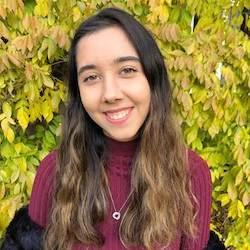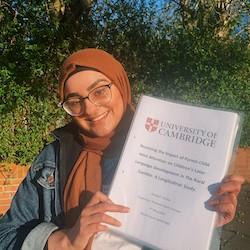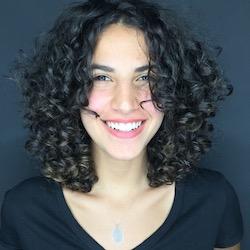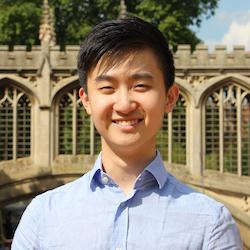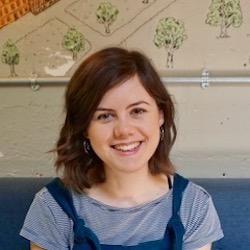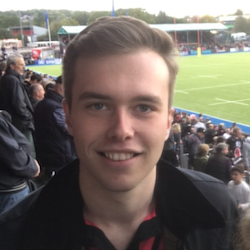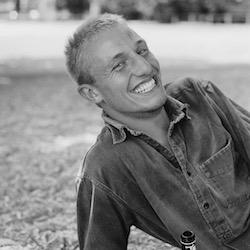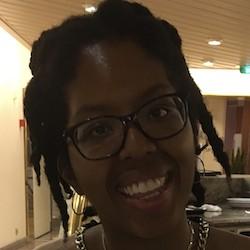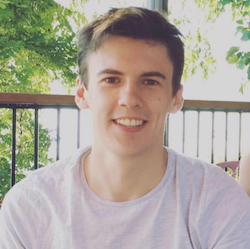Psychology and Behavioural Sciences is a unique programme, so in order to help potential future applicants we have asked some recent alumni to explain why they decided to study Psychology and Behavioural Sciences, what they are doing now, and how their degree has helped them in their career. We hope these profiles help to convey the character of the Psychology and Behavioural Sciences programme and give a sense of the possible career outcomes that this degree could lead to.
PBS alumni profiles
Last updated November 2020
Why did you decide to study Psychological and Behavioural Sciences?
I always knew I wanted to study Psychology, but when I was applying, I also had a bit of an interest in Philosophy and was looking at joint honours courses in a few places. When I researched Psychological and Behavioural Sciences at Cambridge, I realised just how broad it was, and thought that even if I didn’t want to pursue Philosophy (I actually ended up exploring Biological Anthropology for two years instead!) I’d have the option to explore a wide range of subjects before I narrowed down in my final year. For me, developing a wide range of knowledge and skills was the most important thing in choosing a degree, and so that’s why Psychological and Behavioural Sciences appealed so much to me!
What are you doing next?
I’m going to be joining the Civil Service Fast Stream, which gives me three years in various government departments on rotation. I’m not entirely sure what this will involve yet, and that’s definitely part of the appeal for me. In the long term, I’d like to work in behavioural insights, but wanted to develop more transferrable skills and a working knowledge of the government and policymaking before then.
How has your degree helped you in your further career?
Without having studied my degree, there’s a good chance I wouldn’t be on the career path I’m on now. I was introduced to behavioural insights in my first year and ever since I’ve been focused on finding a route into it which enables me to develop other skills too. Aside from introducing me to a career sector I hadn’t considered before, and developing my academic skills, my degree has also given me so much scope for personal development. I feel like my time at Cambridge has honed my drive and motivation, and given me the self-assurance to pursue things that I’m interested in.
Why did you decide to study Psychological and Behavioural Sciences?
I actually wanted to study History for the longest time throughout school; I was really interested in learning why terrible wars and persecutions occurred (and are still occurring today). I soon realised that it was impossible to understand the actions of world leaders and populations who followed their orders without first understanding the basis of human behaviour. Based on this, I decided to study Psychology further at University. The PBS tripos at Cambridge really appealed to me because of how broad it was. There’s a range of optional papers in every year so you have the opportunity to tailor it to your own interests and specialise in what you want to, which isn’t the case at a lot of other Universities. The department is also made up of so many academics who have revolutionised psychological research on a global basis. I definitely have had a few fan girl moments! Being able to be taught as well as work on my own research alongside them has been one of the highlights of my degree.
What are you doing next?
This summer I’ve been offered some funding to continue my third-year project with the Cambridge BabyLab. It’s part of the BRIGHT project, which is investigating social and cognitive development within a rural village in The Gambia. I’m specifically investigating parent-child interaction and language development in Gambian infants and super excited to potentially contribute to a publication in the future. In September, I will be starting a master’s course in Health Psychology at The University of Manchester where I’ll be studying the links between physical and mental health. My specific research proposal focuses on the high levels of co-morbid depression in patients with atopic dermatitis, and whether immunotherapy techniques might support their mental health too. Hopefully this will have real clinical benefit! This masters also provides Stage 1 training in order to become a chartered Health Psychologist in the future, so sets you up for a later career in this area. I’m not sure if this is the trajectory I want to take just yet, but it’s nice that I have options!
How has your degree helped you in your further career?
Being so broad, PBS has really helped develop so many skills; essay writing, statistical analysis, coding even! All of these will be essential for further study and research. More generally, Cambridge provides you the opportunity to develop an analytical and creative mindset which is so necessary in navigating a complex modern world. You soon learn to not believe everything you read and instead think more widely and critically. So even though I don’t know for certain what the future will hold, I know that I have a solid foundation for whatever career I choose to go into, whether that be clinical or research.
Why did you decide to study Psychological and Behavioural Sciences?
I have always been fascinated by the brain and its seemingly endless abilities. During my first undergraduate degree in philosophy, I came to the conclusion that I wanted to further study the inner workings of the brain using empirical methods. I thus chose to study PBS because of the degree’s interdisciplinary options that accommodated my interest in both the social and the natural sciences. Being in such a rich research environment also gave me the unique opportunity to get hands-on research experience in experimental psychology and cognitive neuroscience.
What are you doing now?
I am currently pursuing a Master’s degree in neuroscience with a focus on computational neuroscience at the Ludwig-Maximillian University of Munich in Germany. I am quite interested in human memory, particularly, how previously acquired information can influence our learning through changing our expectations at the moment of learning.
How has your degree helped in your further career?
The broad spectrum of topics covered in the PBS lectures allowed me to identify my particular research interest. Additionally, having had extensive undergraduate research experience available at the department motivated me to pursue research further, and helped me stand out in a pool of very competitive candidates during my postgraduate applications.
Why did you decide to study Psychology and Behavioural Sciences?
Growing up in a strict religious community and having observed relatives attempting to revive my dead hamster through the power of prayer, I have always been fascinated by strange beliefs and ‘us-versus-them’ attitudes that people hold, and how social dynamics can amplify them in spectacular ways. The PBS Tripos presented a unique opportunity for me to gain insights into how the mind works – whether through the lens of social psychology, neuroscience, or biological anthropology – and the ways in which this gives rise to the dizzying interactions that characterize both modern society and family reunions.
What are you doing now?
After graduation, I continued as a research assistant in Dr. Sander van der Linden’s lab, where I investigated how exposure to distinct informational narratives (such as conspiracy theories) is reflected in the language used within online communities. I was also a summer researcher at Nokia Bell Labs, where I used social media data to map geospatial changes in emotional sentiment towards traumatic public events. My interests then led me to apply what I learned to industry, and I am now a Behavioural Science Lead at Edelman, a public relations and marketing consultancy – where I help clients with anything from understanding what makes a die-hard Fortnite fan, to designing ads that get people to talk about (and purchase treatment for) overactive bladder conditions.
How has your degree helped in your further career?
The PBS Tripos taught me about the rewards and challenges of doing research – from formulating a testable hypothesis to presenting your findings. Aside from that, it allowed me to discover my interest in social data science and exploring issues facing society, while also helping me develop the computational skills to do so. This skillset, alongside a critical application of psychological theory and the understanding that social research and analysis is ultimately an exercise in empathy, are all ways in which my degree and the experiences that came with it have helped to shape my career.
Why did you decide to study Psychology and Behavioural Sciences?
Even though I had never studied Psychology before, the PBS degree at Cambridge appealed to me predominantly because of its interdisciplinary scope. This allowed me to combine my core discipline with diverse courses including sociology and social anthropology, law and criminology. I was encouraged to explore interactions between the levels of the individual and the societal, and to pursue lines of research and questioning that crossed over disciplinary siloes.
What are you doing now?
On graduating, I completed an MSc in Refugee and Forced Migration Studies at the University of Oxford. This brought together anthropological, political, ethical, and legal perspectives to approach the multifaceted issue of forced migration. My thesis focussed on the emerging role of digital technology in UK asylum processes.
I now work for Social Finance, a non-profit. We work to address entrenched, systemic social issues, across social, financial, and government sectors. My work has included: exploring community-led support models for resettling and accommodating unaccompanied asylum-seeking children; working with local authorities and national coalitions to respond to rising school exclusions by maximising access to education; and contributing to the development of a strategic response to perpetrators of domestic abuse, to drive change in abusive behaviour alongside supporting survivors.
How has your degree helped in your further career?
My PBS degree equipped me with analytical tools to support critical thinking. I developed confidence in my curiosity, with plenty of opportunities to ask big questions in the context of supervisions, essays, and my dissertation. This prepared me to continue to explore complex social issues without losing sight of their effect on individual people, both in an academic context and in the social change sector. Studying PBS has developed my appreciation for how individuals, and all the intricacies we embody, can be a lens to understanding the intergenerational, social, and environmental influences that coalesce to shape who we are.
LinkedIn: Lucy Boddington
Why did you decide to study Psychological and Behavioural Sciences?
I’d thought I wanted to study psychology for a number of years before applying to university. I went to an access summer school at Oxford to learn about this subject at university level, which confirmed my choice. However, whilst I was there I was able to learn about human sciences, which I was also interested in. The PBS tripos offered me the opportunity to study the psychology I knew I enjoyed, as well as widening my knowledge of human behaviour with everything from sociology to neuroscience.
What are you doing now?
After completing my MPhil, I now work as a Behavioural Scientist in the Cabinet Office. We use theory, evidence, and primary research to diagnose behavioural problems. This involves embedding oneself in the context of a problem to understand how people behave and why, as well as what barriers can be overcome. We then use this knowledge to design and implement creative behavioural interventions. The kind of projects Behavioural Scientists work on across government range from large scale interventions such as Automatic Enrollment of Pensions, to ensuring that leaflets are designed in inclusive ways.
How has your degree helped in your further career?
The number of disciplines you are exposed to in the PBS course is vast, and has enabled me to think about problems from several different perspectives. I have used both cognitive decision science and anthropology on the same project! PBS also encourages you to digest and critically evaluate large amounts of research at pace - which is certainly helpful when the deadlines pile up during a big project!
Why did you decide to study Psychological and Behavioural Sciences?
My decision to apply for the PBS Tripos was driven by the uniqueness of the course, as well as the prestige and reputation of the Department of Psychology.
I had been interested in performance/ sport psychology and human behaviour from a young age, however it was never my intention to pursue a career in research or specialise in the clinical disciplines.
The PBS Tripos offered the opportunity to develop my long-standing interest in psychology under the direction of world’s best academics, whilst also ‘viewing’ human behaviour through the lens of related disciplines.
The depth and breadth of the course is unparalleled.
What are you doing next?
The inaugural PBS Tripos course finished in 2016 and, instead of graduating, I was offered a place on the Judge Business School’s one-year Management Studies Tripos (MST).
After graduating in 2017 with the PBS and MST degree, I undertook an internship at Pitch International – a leading sports marketing agency – before entering full-time employment in the commercial department at Saracens.
In May 2018, I joined the Brand Licensing team at Arsenal where I have account management responsibility for the Club’s international and digital licensees.
I have been fortunate to travel internationally on Club business - Europe and Asia – and I am currently working towards my European Sponsorship Association (ESA) Diploma.
How has your degree helped you in your further career?
It is important to reiterate that the PBS Tripos provides fundamental training that is applicable to a range of career paths - whether that be academia, clinical, or commercial.
The PBS Tripos has positively influenced my career in several ways:
· Psychological principles are key to marketing and brand management (i.e. decision making)
· Problem-solving (i.e. the Tripos trains students to consider ‘problems’ from multiple perspectives)
· Analysis (i.e. the statistical training provides a solid foundation for business analytics)
· Work-ethic (i.e. the Tripos challenges students to achieve the highest standards)
LinkdIn: Leigh Simpson
Why did you decide to study Psychological and Behavioural Sciences?
Psychology wasn’t a subject option at my sixth form. However, I knew that I enjoyed subjects like Biology and Maths and that I was interested in people. After reading bits of ‘Thinking Fast and Slow’ (Kahneman, 2011) and ‘Synaptic Self’ (LeDoux, 2003) I realised I was obsessed with how and why we all make decisions in day-to-day life. So, I applied to Psychology. An application to Cambridge was daunting, but the interdisciplinarity of the PBS really excited me.
What are you doing now?
I am just completing a part-time MSc in Behaviour Change at UCL – where I’ve specialised in intervention design promoting pro-environmental and sustainable actions. I am very excited by how people make green decisions, and am currently applying for PhDs to continue this academic journey. Since graduating, I have also worked as a Behavioural Science specialised in multiple organisations spanning health consultancies, consumer behaviour research organisations, and climate charities.
How has your degree helped you in your further career?
The interdisciplinarity of PBS helped me hone my interests, and now I have a topic area I am fascinated by for a PhD. Professionally, having a psychological and behavioural on the world opens so many doors for industry and you bring a new perspective. I would not be where I am today without PBS.
Why did you decide to study Psychological and Behavioural Sciences?
I had wanted to study psychology at university since watching a talk from a business psychologist at a speech day at school when I was fourteen, and was lucky that work experience I had confirmed this for me. I looked at a variety of courses at different universities, but I knew that my interest was more in social and developmental psychology and I really liked that the PBS course gave an opportunity to study a range of different modules and tailor your degree to your particular interests and style. I also really liked that you could borrow modules from other courses, while still covering a wide breadth of core psychology.
What are you doing next?
I currently work as a therapist in a CAMHS (Child and Adolescent Mental Health) community service, but am due to leave this role to begin my Doctorate in Clinical Psychology at Canterbury Christ Church University in September 2020. This has been my dream since I began this journey, so it is very exciting!
How has your degree helped you in your further career?
The degree helped me primarily while I was at university to consider what work experience I wanted to look for and what areas I wanted to develop in. Having a piece of work experience at the Priory Hospital in the addictions team helped with my dissertation and with my first job application. This then helped me to look for further work opportunities and my current job. Without my current job, I am sure I would not be starting the doctorate this year. My degree helped me to establish that this was the career that I wanted and to continue to pursue that career.
Why did you decide to study Psychological and Behavioural Sciences?
I have always had a broad array of interests, and despite knowing I wanted to study Psychology at university I was reluctant to formally leave behind other disciplines. However, PBS appealed as it offered a strong central training in Experimental Psychology, with the unique ability to craft your own degree, reflecting outside, yet related, interests. For example, I ended up taking papers in areas such as Anthropology and the History and Philosophy of Science alongside core Psychology and Neuroscience options. This interdisciplinary approach to studying human behaviour was the main reason PBS stood out to me.
What are you doing now?
After graduating from PBS, I moved to UCL to start a PhD with Sarah-Jayne Blakemore (now based at the Department of Psychology in Cambridge). My research explores why, as adolescents, we’re more vulnerable to developing mental health problems compared to adults, and why we’re more likely to take risks in the presence of our friends. I like to ask questions which have clear public health and policy implications – an interest I have maintained since joining the Psychology and Policy research group in Cambridge as a PBS student.
How has your degree helped you in your further career?
Firstly, as someone wanting to go onto study for a PhD, gaining research experience was key. Studying PBS provided so many opportunities to get involved with ongoing research projects in the department, to learn new skills and to conduct your own, original, research.
Secondly, one of the unique selling points of PBS is the genuine encouragement to think across disciplinary boundaries. PBS instilled in me an important understanding that our approach, as Psychologists, is just one of many – an insight I have taken forward in my training as a researcher.
Why did you decide to study Psychology and Behavioural Sciences?
I was passionate about the brain for a long time so it was a no-brainer that I would study it at university. The PBS Tripos was a great combination of psychology, neuroscience, and also other relevant subjects such as philosophy and evolutionary biology. I liked that the PBS Tripos was broad and gave a lot of scope for individual choice but at the same time would help me gain in-depth knowledge about how the mind works.
What are you doing now?
After finishing the undergraduate degree I decided to stay and do a PhD in psychology. I am now a Research Fellow at Cambridge University studying the psychological and neural origins of political behaviour. I combine methods from experimental psychology, cognitive neuroscience, and political science to examine why some people are more vulnerable to ideological extremism than others.
How has your degree helped in your further career?
The PBS Tripos was excellent preparation for a career in research and policy. The Department of Psychology supported me in pursuing my research interests and motivate me to continue a career in academia. I was able to gain research experience and even had my undergraduate dissertation published in a prestigious scientific journal while I was a student!
Website: www.leorzmigrod.com


